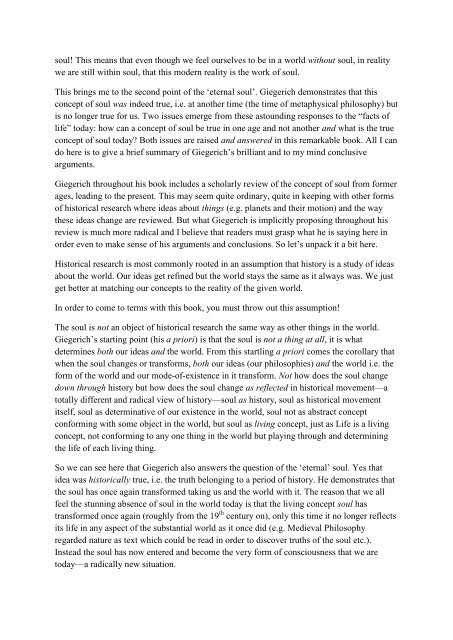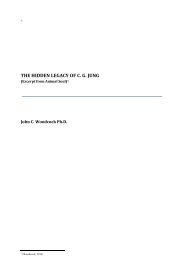WHAT IS SOUL by Wolfgang Giegerich - Lighthouse Downunder
WHAT IS SOUL by Wolfgang Giegerich - Lighthouse Downunder
WHAT IS SOUL by Wolfgang Giegerich - Lighthouse Downunder
You also want an ePaper? Increase the reach of your titles
YUMPU automatically turns print PDFs into web optimized ePapers that Google loves.
soul! This means that even though we feel ourselves to be in a world without soul, in reality<br />
we are still within soul, that this modern reality is the work of soul.<br />
This brings me to the second point of the ‘eternal soul’. <strong>Giegerich</strong> demonstrates that this<br />
concept of soul was indeed true, i.e. at another time (the time of metaphysical philosophy) but<br />
is no longer true for us. Two issues emerge from these astounding responses to the “facts of<br />
life” today: how can a concept of soul be true in one age and not another and what is the true<br />
concept of soul today? Both issues are raised and answered in this remarkable book. All I can<br />
do here is to give a brief summary of <strong>Giegerich</strong>’s brilliant and to my mind conclusive<br />
arguments.<br />
<strong>Giegerich</strong> throughout his book includes a scholarly review of the concept of soul from former<br />
ages, leading to the present. This may seem quite ordinary, quite in keeping with other forms<br />
of historical research where ideas about things (e.g. planets and their motion) and the way<br />
these ideas change are reviewed. But what <strong>Giegerich</strong> is implicitly proposing throughout his<br />
review is much more radical and I believe that readers must grasp what he is saying here in<br />
order even to make sense of his arguments and conclusions. So let’s unpack it a bit here.<br />
Historical research is most commonly rooted in an assumption that history is a study of ideas<br />
about the world. Our ideas get refined but the world stays the same as it always was. We just<br />
get better at matching our concepts to the reality of the given world.<br />
In order to come to terms with this book, you must throw out this assumption!<br />
The soul is not an object of historical research the same way as other things in the world.<br />
<strong>Giegerich</strong>’s starting point (his a priori) is that the soul is not a thing at all, it is what<br />
determines both our ideas and the world. From this startling a priori comes the corollary that<br />
when the soul changes or transforms, both our ideas (our philosophies) and the world i.e. the<br />
form of the world and our mode-of-existence in it transform. Not how does the soul change<br />
down through history but how does the soul change as reflected in historical movement—a<br />
totally different and radical view of history—soul as history, soul as historical movement<br />
itself, soul as determinative of our existence in the world, soul not as abstract concept<br />
conforming with some object in the world, but soul as living concept, just as Life is a living<br />
concept, not conforming to any one thing in the world but playing through and determining<br />
the life of each living thing.<br />
So we can see here that <strong>Giegerich</strong> also answers the question of the ‘eternal’ soul. Yes that<br />
idea was historically true, i.e. the truth belonging to a period of history. He demonstrates that<br />
the soul has once again transformed taking us and the world with it. The reason that we all<br />
feel the stunning absence of soul in the world today is that the living concept soul has<br />
transformed once again (roughly from the 19 th century on), only this time it no longer reflects<br />
its life in any aspect of the substantial world as it once did (e.g. Medieval Philosophy<br />
regarded nature as text which could be read in order to discover truths of the soul etc.).<br />
Instead the soul has now entered and become the very form of consciousness that we are<br />
today—a radically new situation.



